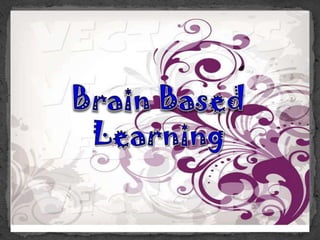
Brain based learning
- 2. Brain-Based learning is a comprehensive approach to instruction based on how current research in neuroscience suggests our brain learns naturally. o This theory is based on what we currently know about the actual structure and function of the human brain at varying stages of development.
- 3. o This type of education provides a biologically driven framework for teaching and learning, and helps explain recurring learning behaviors. o It is a meta-concept that includes an eclectic mix of techniques. Currently, these techniques stress allowing teachers to connect learning to students’ real life experiences.
- 4. Brain-Based Learning is also the application of a meaningful group of principles that represent our understanding of how our brain works in the context of education. Brain-Based Learning is simply the engagement of strategies based on body/mind/brain research.. Brain-Based Learning is not a panacea or magic bullet to solve all of education’s problems.
- 5. Brain-based education is best understood in three words: engagement strategies principles
- 6. Brain-based education is the "engagement of strategies based on principles derived from an understanding of the brain."
- 7. mastery learning learning styles multiple intelligences cooperative learning practical simulations experiential learning problem-based learning movement education.
- 8. For 2,000 years there have been primitive models of how the brain works. Up until the mid 1900’s the brain was compared to a city’s switchboard. Brain theory in the 1970’s spoke of the right and left- brain. Later the concept of the triune brain ( a term coined by Paul McClean that refers to the evolution of the human three part brain) was introduced.
- 9. During the last two decades, neuroscientists have been doing research that has implications for improved teaching practices. Neuroscience is based on information obtained through autopsies, experiments, and different types of scans -- MRIs, EEGs, PET and CAT scans, as well as the most recent brain research lab studies in neuroscience.
- 10. 1. The brain is a parallel processor. It can perform several activities at once. 2. The brain perceives whole and parts simultaneously. 3. Information is stored in multiple areas of the brain and is retrieved through multiple memory and neural pathways.
- 11. 4. Learning engages the whole body. All learning is mind-body: movement, foods, attention cycles, and chemicals modulate learning 5. Humans’ search for meaning is innate. 6. The search for meaning comes through patterning.
- 12. 7. Emotions are critical to patterning, and drive our attention, meaning and memory. 8. Meaning is more important than just information. 9. Learning involves focused attention and peripheral perception.
- 13. 10. We have two types of memory: spatial and rote. 11. We understand best when facts are embedded in natural spatial memory. 12. The brain is social. It develops better in concert with other brains.
- 14. 13. Complex learning is enhanced by challenge and inhibited by stress 14. Every brain in uniquely organized. 15. Learning is developmental. (Caine)
- 15. There are interactive teaching elements that emerge from these principles. Orchestrated immersion: Learning environments are created that immerse students in a learning experience. Relaxed alertness: An effort is made to eliminate fear while maintaining a highly challenging environment. Active processing: The learner consolidates and internalizes information by actively processing it.
- 16. 1) Rich, stimulating environments using student created materials and products are evident on bulletin boards and display areas. 2) Places for group learning like tables and desks grouped together, to stimulate social skills and cooperative work groups. 3) Link indoor and outdoor spaces so students can move about using their motor cortex for more brain oxygenation.
- 17. 4) Safe places for students to be where threat is reduced, particularly in large urban settings. 5) Variety of places that provide different lighting, and nooks and crannies. 6) Change displays in the classroom regularly to provide a stimulating situations for brain development.
- 18. 7) Have multiple resources available. Provide educational, physical and a variety of setting within the classroom so that learning activities can be integrated easily. 8) Flexibility: This common principle of the past is relevant. The ‘teachable moment” must be recognized and capitalized upo 9) Active and passive places: Students need quiet areas for reflection and retreat from others to use intrapersonal intelligences.
- 19. 10) Personal space: Students need a home base, a desk, a locker area. All this allows learners to express their unique identity. 11) The community at large as an optimal learning environment. 12) Enrichment: The brain can grow new connections at any age.
- 20. Music: Music can lower stress, boost learning when used 3 different ways: as a carrier - using melody or beat to encode content, as arousal - to calm down or energize, as a primer - to prepare specific pathways for learning content) impacts the immune system, and is an energy source for the brain.
- 21. Art: Art is an important part of brain-based education in that it provides many learners with avenues of expression and emotional conduits for learning and retaining information. Diverse forms of assessment: students should be exposed to multiple assessment methods. (Jensen)
- 22. .. Good Afternoon ..
- 23. Prepared by:
